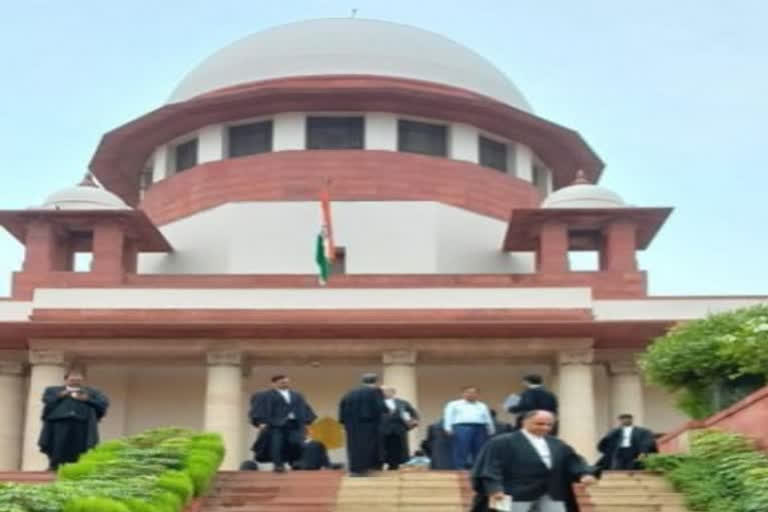New Delhi: The Supreme Court on Tuesday upheld the validity of the Haryana Sikh Gurdwara (Management) Act enacted by the state legislature to manage the religious places of Sikhs effectively and permanently under the exclusive control of the Sikhs of Haryana. The top court said impugned enactment falls within the legislative competence of the Haryana State Legislature.
The law of 2014 provides a legal procedure by which the Gurdwaras, owing to their origin and habitual use, regarded by the Haryana Sikhs as essentially pious places of worship, may be brought effectively and permanently under the exclusive control of the Sikhs of Haryana for their proper use, administration, and control. A bench of Justices Hemant Gupta and Vikram Nath said that the Punjab Reorganisation Act, 1966 as well as the Inter-State Corporation Act, 1957 confer power on the Central Government for the smooth transition of new States coming into existence as a consequence of the reorganization.
"There is no provision in the 1966 Act which confers legislative power upon Parliament in respect of the subjects over which the State has legislative competence in terms of List II. Therefore, the transitional provisions i.e., the 1966 Act or the 1957 Act do not impinge upon the legislative competence of the State legislature to enact a law on the subjects mentioned in List II", the bench said. The top court said that the 1957 Act is a statute to empower the Central Government to issue directions from time to time so that on account of the creation of separate States, such statutory bodies in the new States can function smoothly.
The bench rejected the pleas of petitioner one Harbhajan Singh, Centre, and The Shiromani Gurdwara Parbandhak Committee that the Haryana State Legislature does not have any power to legislate in respect of an inter-state corporation which is evident from the reading of provisions of the 1966 Act. The law defines the "inter-State corporation" as any body corporate constituted under any of the Acts specified in the Schedule and functioning in two or more States by virtue of Section 109 of the 1956 Act, it said, adding that in respect of such inter-State corporations, the Central Government could issue directions in terms of the 1957 Act only to give effect to the reorganisation of States so that the inter-state entity is able to function and discharge the statutory mandate in the States so constituted.
The bench said, "Such directions were transitional in nature so that the functioning of inter-State corporations is not obstructed or curtailed on account of reorganisation of the States. Neither the 1956 Act nor the 1966 Act nor the 1957 Act has taken away the legislative competence of the States to legislate on the subjects which finds mention in List II of the Seventh Schedule and/or in respect of matters falling in List III of the Seventh Schedule in the manner prescribed". It said that the 1956 Act or the 1966 Act empowers the Central Government to issue directions to make the inter-state entity functional, but the Central Government has not been empowered to legislate in respect of such inter-State bodies which came to be operational in one or more States due to the reorganisation of the States.
The bench added that the consistent view of the three full Benches of the High Court and this Court is that the power of the Centre to issue directions under Section 72 of the 1966 Act is a transitional provision. It said, "Therefore, we have no hesitation to hold that the power of the Centre to issue directions under Section 72 of the 1966 Act is indeed a transitional provision to ensure smooth and continuous functioning of a body corporate so that it is not paralyzed on becoming an inter-State body corporate due to reorganisation of the erstwhile State of Punjab".
The top court added the directions contemplated by Section 72 relate to the functioning and operation of such body corporate and a competent State legislature is not deprived of its power to legislate on the subjects falling within its jurisdiction in terms of List II of the Seventh Schedule. "The 1966 Act 49 does not bar the State Legislature to legislate on the fields of its legislative competence falling under List II of the Seventh Schedule or even in List III of the Seventh Schedule, subject to the limitations as are prescribed in the Constitution", the bench said.
It added the question of assent by the President as per article 254 (2) of the Constitution does not arise for consideration as the impugned Haryana Act does not fall in Entry 28 of List III of the Seventh Schedule. "In view of such Entry being in the concurrent list, the State can legislate in respect of charities, charitable institutions, charitable and religious endowments, and religious institutions. The assent of the President would be necessary if there is an existing statute and the State law is contrary to some of the provisions of the Central law", it said.
The bench said that the Haryana Committee is the incorporation of a juristic entity that more appropriately falls within the domain of Entry 32 of List II and though the Haryana Committee is in respect of religious purpose, but the prime intention is of incorporation of a juristic entity to manage the affairs of the Sikhs in the State. (PTI)



